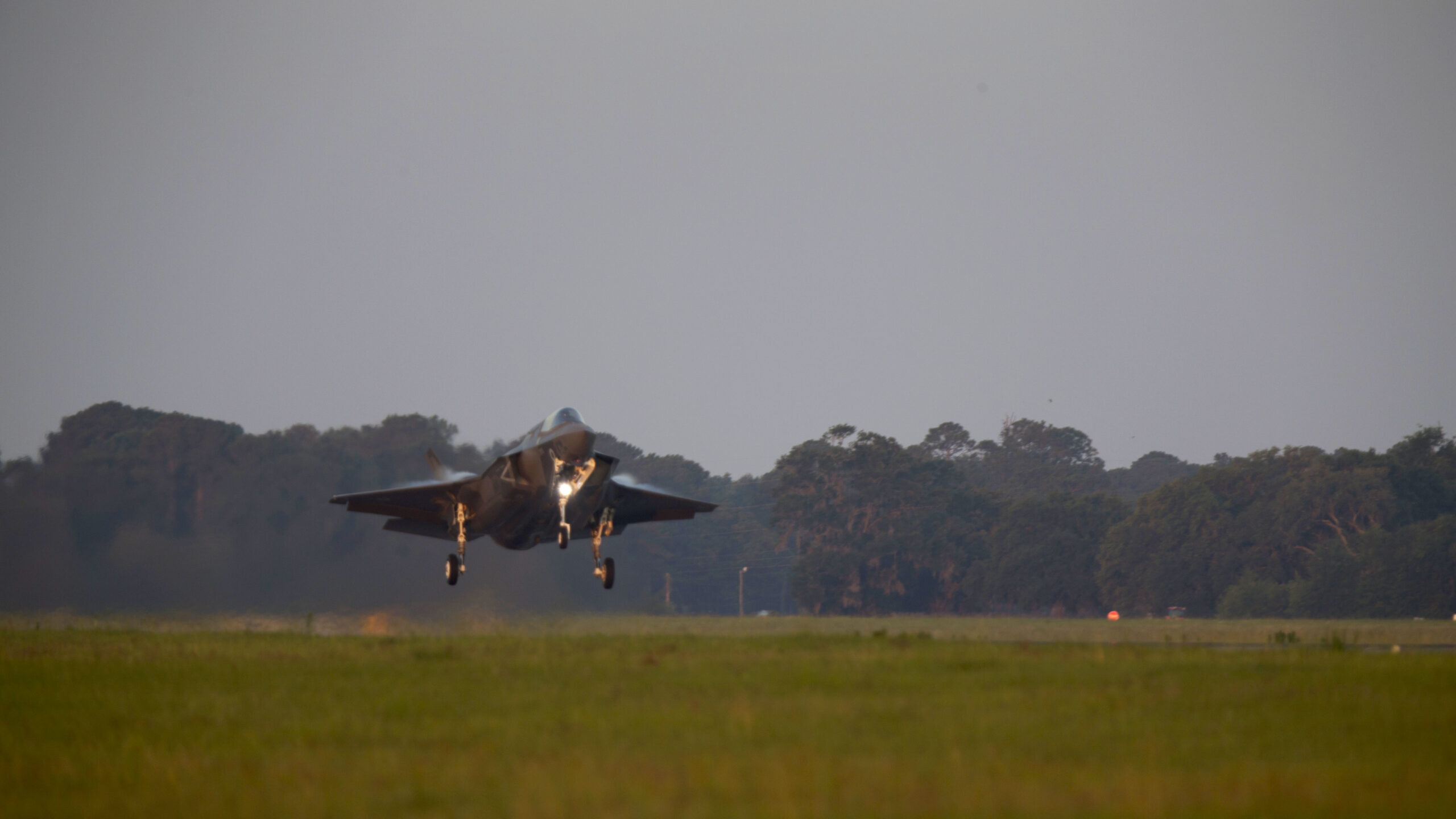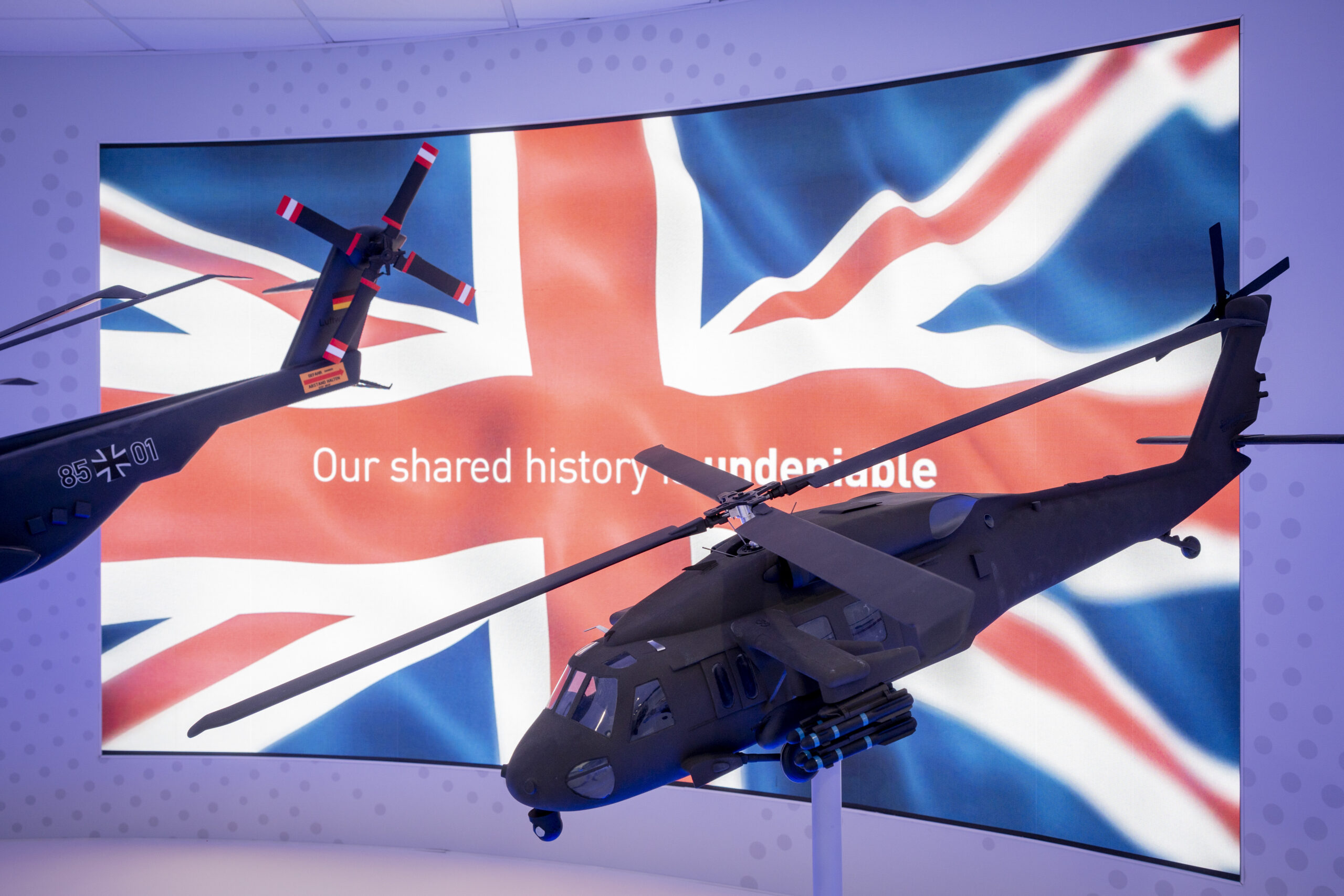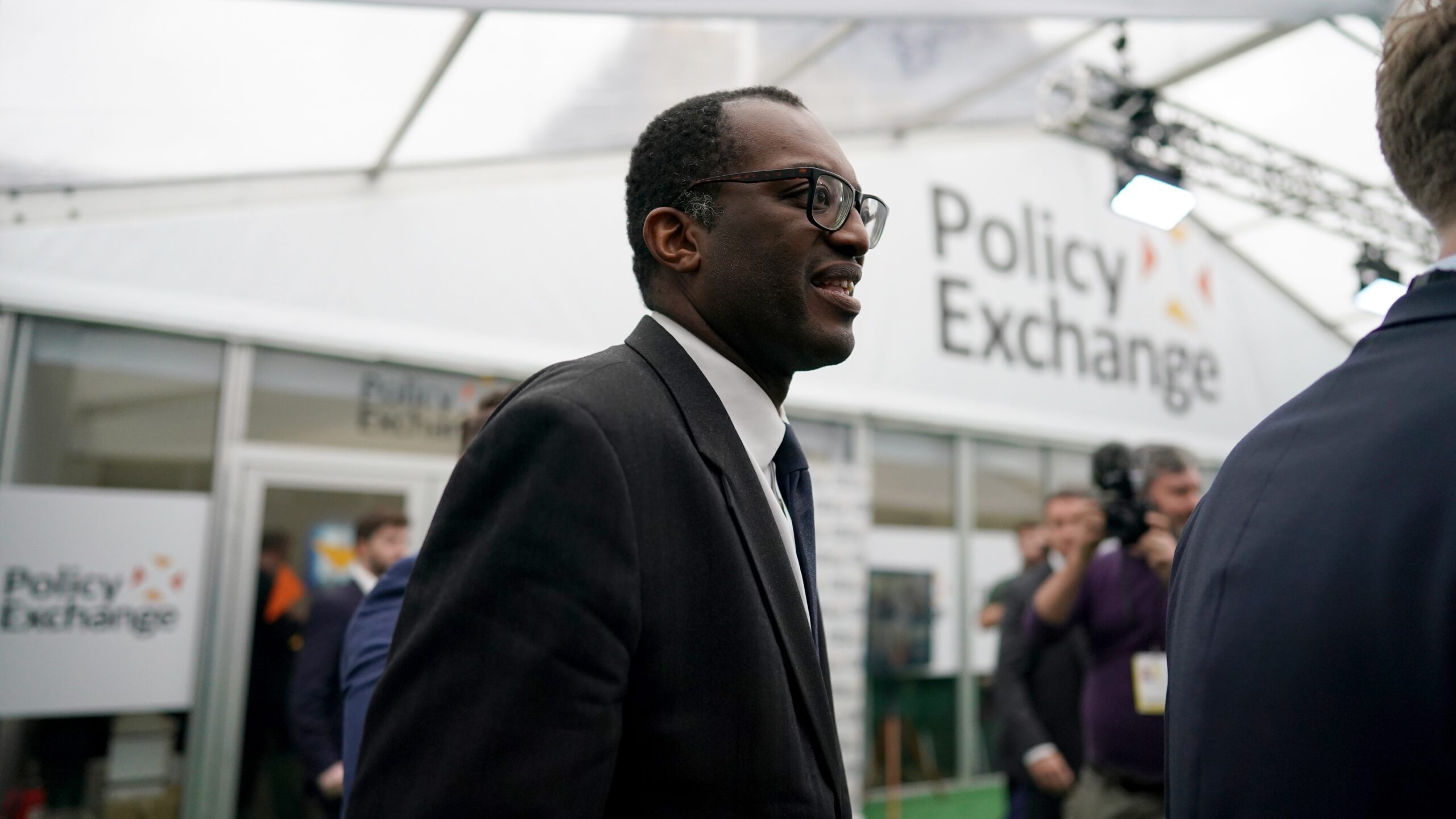
BELFAST — As the UK faces a severe economic downturn and cost of living crisis brought on by rising inflation, the impact of COVID and Brexit, close observers of the British defense industry are wondering if the situation will lead to a surge of takeovers by US and foreign investors.
Interest from across the Atlantic in UK military technologies has been plainly obvious for decades, making acquisitions a common but no less worrying aspect of the British defense scene. Four high profile takeovers have occurred over the last three years alone, with a fifth expected in 2023 should Viasat take control of Inmarsat.
The underlying basis for such interest can largely be attributed to UK suppliers being undervalued and looked upon as easy targets for those with deep pockets and a will to stifle competition or disrupt the market, analysts said.
Multiple UK defense companies routinely trade “at a discount versus their US peers,” said Kai Balder, Partner at Roland Berger, a strategic consultancy firm. “The share price of aerospace and defense companies that predominantly sold to the US defense market were least impacted by COVID, but companies outside the US and who were exposed to civil aerospace, were most severely impacted, among those were UK companies.”
But the pound’s fall versus the dollar, compounded by the economic and political turmoil resulting from the catastrophic six week term of Prime Minister Liz Truss, has exacerbated the issue, leading to growing concern among industry and experts that British firms could increasingly find themselves M&A targets in the near term.
New UK defense takeovers “are a real and present danger, especially for mid-tier suppliers, who appear to be particularly vulnerable,” said Andrew Kinniburgh, director general at Make UK Defense, a manufacturing advisory body.
Trevor Taylor, Professorial Research Fellow in Defense Management at the Royal United Services Institute, a UK think tank, said, “The weakness of the pound obviously makes the UK a more attractive target for foreign investment, if you think that the defense sector is going to do well and the UK defense budget holds up.”
In keeping with increased defense spending pledges across Europe following Russia’s war in Ukraine, London has said it will commit spending of 3 percent GDP to the military sector, up from the current 2.2 percent level. Uncertainty hangs over whether that target will be reached after the Autumn Statement, the annual UK budget review published on Nov. 17, failed to offer any increase in UK defense spending. Instead, any decision to do so will be delayed until an “Integrated Review Refresh,” the UK defense strategy update, has been completed. (That document is expected before the end of 2022.)
How these key spending issues are resolved will naturally have a significant influence on foreign investors deciding on new UK acquisitions, alongside more common trends associated with manufacturers looking to expand export sales.
“I think what’s interesting now is that there are some signs of American companies buying certain technologies here [in the UK] because they recognize what a burden and hindrance ITAR is to their operations,” said Taylor. ITAR, International Traffic in Arms Regulations, is a United States-imposed system that controls the export of the country’s military goods.
‘A Uniquely British Problem’
The ability of US firms to acquire technology by taking ownership of a competitor business and then have it migrate overseas is due, in large part, to the UK government accepting the practice.
“In principle, the UK has always said that it wants to maintain ‘operational sovereignty’ over critical technologies, but in practice, operational sovereignty is determined by what the UK can afford (not the criticality of the technology, which is the criterion used in the US), and once the [UK defense] companies are taken over, there is a strong risk of capability migrating offshore,” explained Balder.
He noted that UK defense companies “with a US presence” are required by law to be overseen by a US proxy board or comply with a special security arrangement (SSA), meaning that “ultimate control rests with a board of US citizens…. They will always have ultimate ownership of critical technology.”
Even so, Taylor suggested that the general impression of UK defense takeovers being interpreted as asset stripping ventures for new investors falls away when cases like US-based General Electric, Italy’s Leonardo and France’s Thales are considered. All three have thriving UK businesses covering aircraft engines, helicopters and radars and sonars, respectively.

Huge differences in the defense industries of the UK and US, especially around public perception, do however play into the wider takeover trend, according to Kinniburgh. US defense firms are seen as “recession proof and a great industry to be a part of,” while in the UK that is simply not the case, he explained.
“We seem to have a uniquely British problem, certainly in terms of the people I speak to from the City [the UK’s financial district in London] and defense sector, of not wanting to invest in defense,” Kinniburgh told Breaking Defense.
Access to capital also appears to be a huge headache, especially for medium-tier UK defense suppliers, turning over in the region of £20-30 million ($24-35 million), who Kinniburgh said are being denied overdrafts because some high street banks reject applicants that have more than 10 percent of their overall business aligned with the military sector.
Faced with being unable to access new lines of credit, one UK vehicle Original Equipment Manufacturer even considered rebranding as a humanitarian company, Kinniburgh claimed.
“UK defense is well respected around the world,” said Kevin Craven, CEO of ADS Group, a UK aerospace advisory body. “The UK armed forces are respected in terms of capability and therefore the kit that they are using comes with a stamp of approval, or that has a helpful marketing element to it.”
Even so, he explained that UK stock markets fundamentally value British defense companies less than US companies do.
“There is kind of a structural difference in valuations where, essentially, if you’re trading in the US, UK companies are some 10 to 15 percent cheaper in valuation, so that level of discount is obviously incredibly attractive to people,” added Krevan.
Remarkably, Kinniburgh suggested that one of the leading issues that the UK defense sector faces in terms of maximizing investment potential is that the Church of England tends to have an exceptional influence on the domestic investor community, even “setting the tone” for future trends.
“Church investments are quite dominant in the UK, there’s many billions of dollars splashing around in church pension funds and clearly from an ethical and moral perspective, they are not keen at all on the defense industry,” he said.
Of course, the changed economy doesn’t mean US firms absolutely will look to gobble up UK companies. Speaking to Breaking Defense in October, Bill Lynn, CEO of Leonardo DRS, said that while the cheaper prices might move a firm to take action on a previously 50-50 M&A move, companies still need to think strategically about what they are adding.
“Where we’re targeted, really, is not geographic …It’s more that we have these four core markets: force protection, network computing, advanced sensing and electric power and propulsion. That’s where we’re looking. So you know, a UK company that fits in those four core markets, yeah, we’d be interested. A UK company, just because the prices are cheap? No, that’s not how we’re [thinking] – it’s nice, it might make the case, but we’re gonna stay inside that area of four core markets and strengthen ourselves there.”
Reason For Concern
Smaller UK firms have been targeted in recent years, even before the economic situation evolved. And the outcome of those moves has left local defense advocates shaken.
Advent International, a private equity firm headquartered in Boston, MA, got the ball rolling when it completed the acquisition of Cobham, a UK aviation and space supplier, in January 2020, despite reports that the UK Ministry of Defense (MoD) objected to the move on the basis that sensitive military information could be exposed should the new parent company decide to “exit parts of the business,” according to The Guardian newspaper.
“You could see the takeover coming for quite a while,” said Balder. “I remember tracking the Cobham share price for a very long time and it just kept dropping and dropping. My perception is that it had become very complex to manage because there were so many different things that the company was doing all at once.
“At some point, if you haven’t built up the portfolio and know every nitty gritty detail of every single business that you have, it just becomes too difficult to comprehend all the kinds of different drivers that your business is exposed to.”
Despite Advent heavily messaging that it would deliver on the “full potential” of each company under the Cobham umbrella, within 18 months it had taken the very course of action those who opposed the takeover most feared, disposing of the pieces, sell off after sell off.
The most high profile of those divestments was the decision to sell Cobham Mission Systems to Eaton Corporation, an American-Irish power management supplier for $2.8 billion. That sale was closely followed by Advent giving up its stake in Airtanker, the consortium under contract to deliver the UK’s Future Strategic Tanker Aircraft program.
Before the controversy over those moves could settle, Advent (via Cobham) then acquired Ultra Electronics, a UK-based submarine and sonobuoy supplier, after months of debate about whether approval of the acquisition might compromise critical naval data — not least because of Ultra’s industrial contribution to the UK Trident nuclear submarine program.
In the end, Kwasi Kwarteng, then UK Business Secretary, formally cleared the £2.6 billion ($3.1 billion) takeover in July 2022 but on condition that two new legal entities, covering UK Ultra facilities, be set up as a means to continue the sharing of “sensitive capabilities” with the British government.

Just 13 days after approval of the Ultra acquisition, the UK government also cleared Parker Hannifin’s $6.3 billion takeover of Meggitt, with the US flight control and actuation systems supplier confirming in a first quarter fiscal 2023 results conference call on Nov. 3 that it has so far injected $2 billion in cash to support integration of the new company, a Dorset, UK, composite aerospace manufacturer.
Meggitt’s US business already partners on a wide range of Pentagon programs including F-35, F-22, F-16, F/A-18 fighters, P-8 maritime patrol aircraft and AH-64D Apache attack helicopters.
“This is a case of one engineering company buying another and you can see the logic in it because parts can be produced locally and there’s also a cost of operation benefits — really it’s good for business from a manufacturing perspective,” said Mike Rowe, Global Practice Leader for Aerospace and Defense at Frost and Sullivan, a business consulting company based in San Antonio, Texas.
In the case, Rowe said, the takeover was likely more palatable to the British government because Parker didn’t have plans to break Meggitt up.
“The [UK] government will be much happier to see production lines being extended rather than someone [a competitor foreign investor] looking to take a knife to a business and assess which parts are worth keeping and which are not,” Rowe continued. “That can bring with it a loss of control, risk and additional costs [for the government], so I think there was a lot of encouragement to go with Parker.”
Others have followed in the footsteps of Advent and Parker, with Israel’s Rafael acquiring Pearson Engineering, based in Newcastle, Northern England, under a stock purchase agreement in September 2022.
The deal means that the two parties will collaborate on the UK’s Challenger 3 upgraded main battle tank for which Pearson and subsidiary Responsive Engineering (now also under Rafael ownership) make turret structures.
Additionally, Pearson will locally manufacture and integrate Rafael’s Trophy Active Protection system on Challenger 3, according to a Pearson statement issued at the time of the acquisition announcement.
“The motivation for us [in acquiring Pearson] at Rafael was quite clear,” said Yoram Arun, Managing Director of Rafael UK, in a statement. “Pearson is a household name in the UK and worldwide and they specialise in a field where some of Rafael’s most sophisticated life-saving technologies have been developed. Pearson’s work in the field of robotics as well as remotely controlled systems provide another area where Rafael can benefit from Pearson’s capabilities.”
More acquisitions of UK companies are almost certainly ahead. A bid from California-based Viasat for satellite mobile communications company Inmarsat has still to result in a formal takeover after intervention from the UK’s Competition and Markets Authority delayed the $7.3 billion deal. Despite the watchdog’s continuing concerns over the acquisition because of how it could unfairly influence inflight connectivity market competition, approval could realistically be given by the UK government in the second quarter of 2023.
While those kind of revelations speak to the emergency measures some suppliers are tempted to take in order to sustain business, such extremities are not representative of a wider picture. After all, the UK is estimated to be the second largest exporter of defense goods, behind the US — based on value of order/against contracts signed between 2011 and 2020 — per UK Defense and Security Export statistics.
That track record makes for good reading in isolation, but not when the companies involved can so easily fall prey to new investors.
“I think the conditions are there [for future takeovers], the question is really, how many targets are left?” surmised Balder.